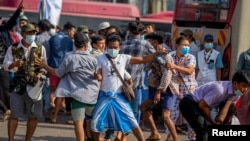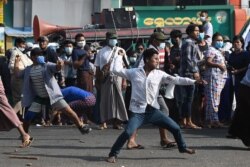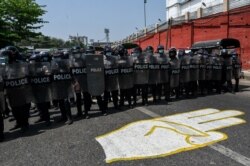The political crisis in Myanmar took a new turn Thursday when supporters of the military junta in Yangon attacked demonstrators protesting the February 1 overthrow of the civilian government.
The violence capped a day that began when hundreds of pro-military supporters turned up for a rally in downtown Yangon. The Associated Press reports the pro-military supporters were marching near the city’s central railway station when they were jeered by a group of bystanders, and responded by firing slingshots and throwing stones at the bystanders.
Video posted on social media showed several pro-military demonstrators attacking a man in front of an office building, with at least one of the demonstrators carrying a knife.
The escalating crisis prompted Facebook to ban Myanmar’s military from the social media platform and its affiliated site, Instagram.
“Events since the February 1 coup, including deadly violence, have precipitated a need for this ban," the social media giant said in a statement. Facebook also banned several military-affiliated entities from advertising on the platforms.
Myanmar’s military did not immediately respond to the ban.
The social media platform has been widely used by Myanmar’s military government, despite its ban in the days immediately following the coup.
In recent years, Facebook has pushed back against Myanmar’s military after drawing global criticism for not controlling online hate campaigns.
The American social media giant banned Senior Gen. Min Aung Hlaing and other top officers and groups and took down hundreds of accounts and pages operated by members of the military. Min Aung Hlaing is currently the country’s military ruler.
Facebook acknowledged Thursday there were efforts to rebuild networks operated by the military that had been previously removed.
Popular protests against the coup have been staged across Myanmar on a daily basis since the military detained de facto leader Aung San Suu Kyi and other members of the civilian government on February 1, claiming widespread fraud in last November’s election, which Suu Kyi’s National League for Democracy won in a landslide.
The United Nations said 150 people in the capital were arrested Monday.
“The U.N. team is currently tracking more than 900 political and state officials, activists and civil society members – including journalists, monks and students – now being detained. And of course, we call for their immediate release,” U.N. Spokesperson Stephane Dujarric told reporters Thursday.
Three people have been killed as a result of the daily protests, including two who died Saturday in Mandalay — one of them a teenage boy — when police and security forces used live rounds and rubber bullets, tear gas, water cannon and slingshots against demonstrators.
Massive demonstrations on Monday, combined with a general strike, took place in defiance of the junta’s ominous warning issued the day before that protesters were heading down a “confrontation path where they will suffer the loss of life.”
The junta has declared a one-year state of emergency. Min Aung Hlaing has pledged that new elections will be held to bring about a "true and disciplined democracy,” but did not specify when they would take place.
Myanmar’s electoral commission denied the military’s claims of election fraud.
The United States and other Western nations have demanded the release of Suu Kyi and her lieutenants, who have been detained since the coup, and called on the junta to restore power to the civilian government.








